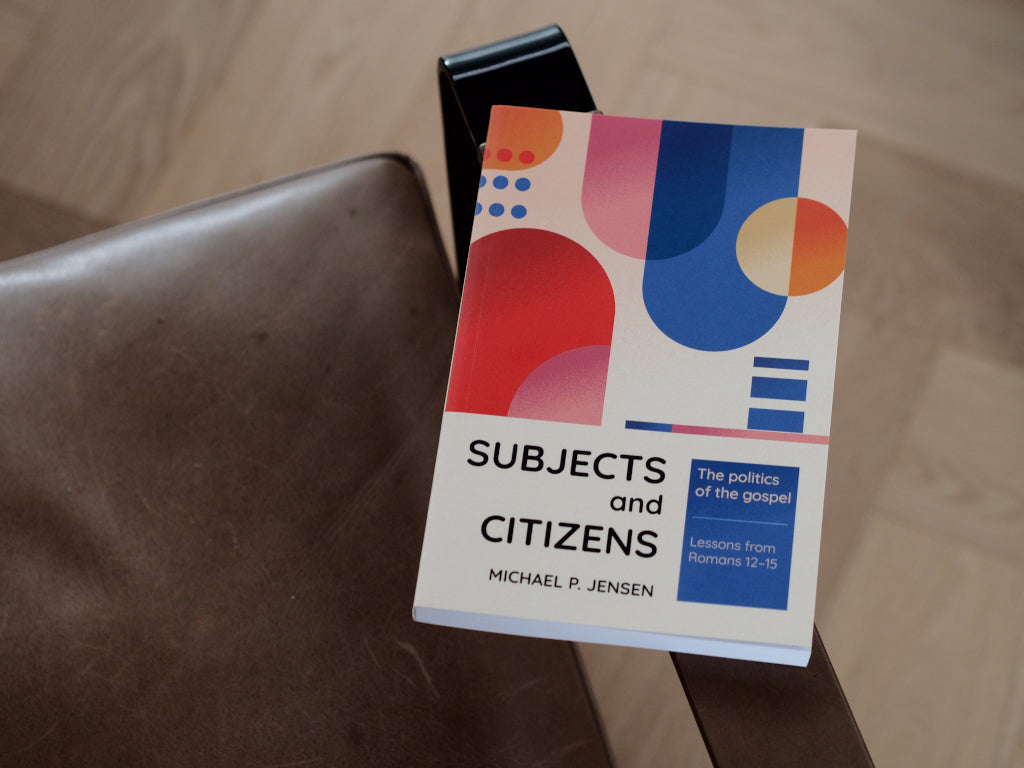Excerpt from Subjects and Citizens
How should the people of God's kingdom think about the politics of the world they live in? Michael Jensen dives into this very question through the lens of Romans 12–15 in his book Subjects and Citizens (just $15 until 3 May 2025). In this excerpt Michael explains some of the common ways Christians approach politics and how we can live more consistently with the gospel.
‘Politics 1.0 and 2.0’
From Subjects and Citizens by Michael Jensen
I have written this book because Christians have been too tempted to think that changing the government or changing the law (or not changing it) is what they should be all about. This is what Russell Moore has called the “politicization” of the church.* I think that in many instances, Christians become more passionate about a certain type of politics (Politics 1.0, that is) than about the gospel of Jesus the Lord (Politics 2.0). Politics 2.0 has strong implications for Politics 1.0, but the two mustn’t be confused. The sad thing about this is that Christians have too often become another one of the anxious tribes battling for power. We’re too happy when ‘we’ win, and too devastated when ‘we’ lose.
I am here outlining a form of what has been traditionally called the ‘Two Kingdoms’ doctrine. This view of human politics has long been held by Protestant Christians, though it is heavily influenced by the great Augustine of Hippo, who wrote in the fourth and fifth centuries. The doctrine of the Two Kingdoms distinguishes between the ‘earthly’ kingdom, which exists temporarily within the present age, and the ‘heavenly’ kingdom, which exists here and now within the church, but will continue into the world to come when Christ returns. God rules over the whole earth, but he rules in two ways. Through the secular kingdom, he restrains evil by the power of the sword, according to his common grace. In the spiritual kingdom, he redeems people by the power of the Spirit.
There are many variations to the Two Kingdoms doctrine. The question of how the Two Kingdoms are to relate to one another is especially debated. In this book, I will set out some thoughts about this in terms of the relationship of Politics 1.0 to Politics 2.0. Thinking of politics in these terms is extremely helpful for Christians, because it helps them to understand the purpose and the limits of earthly politics. It helps them to not confuse the two.
The fact that this distinction has frequently been forgotten by contemporary Christians is evidenced by three observable tendencies in Christian thinking about Politics 1.0 in the contemporary world.
First, it might be that you are concerned about the advancing de-Christianization of your nation’s political scene. Whereas once you could say that the agreed moral compass of your country was roughly Christian, that is now no longer the case. Many Christians would say that this has occurred especially in issues of personal morality, of life (euthanasia and abortion), and of the structure of the family. Your fellow citizens may no longer regard the Christian heritage of their culture and constitution as relevant. Indeed, they might regard Christianity as a deeply problematic part of the political culture of a previous generation and wish to step deliberately away from it. In reaction to these concerns, then, Christians may have a tendency to fight to maintain or restore Christian values—and possibly even an explicit Christian identity—within the political scene.
The second tendency is to see the major issues of concern as primarily systemic rather than individual. Under this view, Christians should be deeply concerned for issues of ‘social’ justice. We should be committed to radical action on behalf of the poor or the environment. Perhaps, under this view, it matters much less if a society at any point identifies as Christian, but the mission of the church will be served if a particular vision of social justice is accomplished.
A third tendency for Christians is to opt out of Politics 1.0 altogether. This position is often made more attractive by the politicization of other Christians! The issues of politics are far too complex and debatable, in any case; the church should stay out of the political and concentrate on winning people for Christ, or on living out a version of Politics 2.0 supposedly uncorrupted by the world.
While I have sympathy for all three of these options in different ways, they are each, I believe, deficient accounts of a Christian view of politics. What I want to show in this book is that Christians have a different kind of politics to offer altogether: a Politics 2.0 that is powerfully transformative and yet also authentically Christian. What Paul shows us in Romans is that we have much more to hope for than we imagine. He shows us that even when the church doesn’t hold access to the reins of political power, we are still very much empowered. We need not—and must not—be anxious, for the Jesus Christ we worship is Lord.
What I am arguing here is that we need to reconsider what politics itself is. We tend to assume that politics is what political parties do in a democracy: they work to hold the power to organize societies to some end that they have in mind (what I am calling Politics 1.0). They represent the interests of certain groups and try to advance those interests. In a democratic society, this work is done, usually without violence, at the ballot box.
It is certainly not wrong for Christians to be involved in that sort of politics. On the contrary, it is right for us to have views about how our nation should be governed, and by whom. Indeed, Paul calls on the Roman Christians to be exemplary citizens—even to pay their taxes to Caesar! This is definitely not a call to withdraw from the world, or to try to be apolitical. However, Paul also shows us that that Politics 1.0 has its limits. It is vital to have good government that restrains wickedness and promotes justice, goals towards which Christians much surely work; nevertheless, human government cannot deliver the kingdom of God. We can anticipate it, but only God can establish his kingdom. We should not be surprised that Politics 1.0 is a messy and imperfect business, even when a Christian is in power.
The other kind of politics, however, is that of living together as the people of God as we worship and revere Jesus Christ as Lord, and call others to join us: Politics 2.0. Just being the church of Jesus Christ is a political act. When we do that, we testify to our society that human power is not absolute and eternal, and we testify to a different way of doing politics, a way shaped by faith in Jesus Christ, love of our neighbour, and hope in Christ’s eternal reign. We do not take power in the name of Jesus. Instead, we are to be witnesses to the truth and the goodness of his power. For Christians who feel frustrated and alienated by our lack of success in Politics 1.0, this is very good news.
* R Moore, ‘Losing our religion’, Russell Moore, 15 April 2021 (russellmoore.com/2021/04/15/losing-our-religion).










